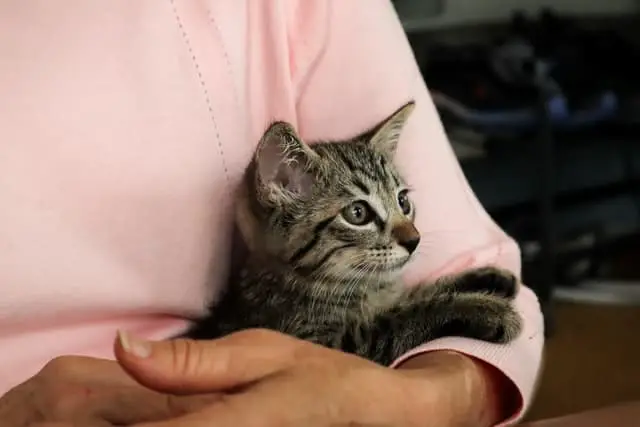House cats can be very happy in the home, but they need a stimulating indoor environment, games, and lots of company.

Cats have adapted to living with us inside our homes. But are house cats happy? The answer is yes, the experts explain. Or rather: a domestic cat can be very happy, as long as we respect ten golden rules. Among them, offering the cat enough space at home to roam around , placing feline beds at different heights, respecting the privacy of its litter box and providing it with the company and love that this affectionate and furry friend craves so much.
Cats have adapted to living in the homes of their humans. But are house cats happy? The answer is yes, the experts explain, albeit with conditions. A domestic cat can be very happy, as long as 10 golden rules are followed, including: providing enough space at home to roam around, placing feline beds at different heights, respecting the privacy of its litter box, and providing it with the company and love that it so much longs for this affectionate and furry friend.
What does a house cat need to be happy?

Domestic cats are affectionate animals, who enjoy human company, but require a stimulating indoor environment
As with wild cats in their natural environment, home kittens need to have their needs covered in the environment where they live, in this case the home of their human. Domestic cats without access to the outside of the house need a quality interior space that meets their feline needs.
Consequently, house cats do not only need a quality diet. To be happy, these furry companions need to be busy, to receive the necessary stimuli to develop their intellect and intelligence.
For their owners, these requirements imply an additional effort. But the feline will more than make up for it, with affection and furry cuddles everywhere. Like so many other times, when it comes to these animals, giving is receiving.
1. A happy house cat needs room to roam
The first rule of thumb to make your house cat happy is to provide it with enough space to roam around the home. Domestic cats adapt well to living indoors, but the cat needs access to several rooms in the house
2. A house cat needs beds of different heights
Domestic cats need to have feline beds at different heights, one closed on the ground and another in height, which allows them to inspect
Felines have the ability to turn the most unexpected spaces of the house into a comfortable bed. Chairs, drawers, the inside of a closet and even the sink are likely to be used as a bed for the versatile cats to rest.
Owners must attend to this feline nature to make their house cat happy: consequently, the furry companion needs at least two beds. These must also be placed at different heights.
One of the cat’s beds should be on the floor, have a roof and three walls – for this, a conditioned cardboard box is usually worth it. The second bed is recommended to be installed in height , but accessible to the animal. In addition, whenever possible, this aerial bed should have a view of the front door or a window; in this way, the feline will be able to monitor its territory.
Not all cats will use both beds, because there are felines that are safer on the ground, while others prefer heights; but it is convenient to give them the option.
3. A happy house cat needs a protected litter box
A domestic cat needs a clean litter box , large enough to allow it to be comfortable and placed in a secluded location , that is, to ensure privacy.
In addition, domestic cats will feel more comfortable if this litter box is away from exterior windows or glass, that is, away from the prying eyes of other cats outside the house.
4. A house cat will enjoy a safe terrace or balcony.
The environment of a domestic feline is far from being as stimulating as the outside. Those who live at home cannot enjoy the variety of scenarios and situations that are presented in an outdoor environment. For this reason, responsible owners must try to ensure that the house meets their needs, in order to ensure the well-being of the domestic cat.
A secure terrace or balcony, that is, covered with meshes that allow light to enter but prevent the animal from escaping, misplacing or suffering an accident, will provide the domestic feline with a stimulating space. This area will provide the furry companion with direct sunlight, noises from the outside, new smells and even the possibility of hunting insects and other small animals that break into its territory.
5. Catnip: a feline delight
Eight out of ten cats are attracted to catnip, a herbaceous plant 40 centimeters long with serrated leaves that has a smell similar to mint. Catnip exerts a narcotic effect on many cats, they enjoy it, and it is not strange to see a feline jump or run from one place to another after having chewed this plant.
6. A happy house cat needs scratchers
House cats need scratchers to sand their nails, de-stress and leave powerful visual and odorous signals to the rest of the felines in the home. The scrapers for cats can be made at home in a simple manner.
7. A happy cat needs to play with its human.
Felines develop their intelligence, but also social behaviour, through play. This explains why it is so important for your human to set aside time to play with the cat . Games promote the physical health of the feline, develop their hunting skills and instincts and strengthen the relationship between cats and humans.
8. A happy feline eats in a balanced way
A balanced diet is one of the keys for the domestic feline to be happy. It is important not to overfeed them and to put them on the scale regularly to prevent him from exceeding its ideal weight.
9. A happy cat … and accompanied
Cats also love their humans and enjoy their company. A feline that spends too much time alone at home is easy to find boredom and the unhealthy consequences of loneliness.
Nor should we rule out the cat’s coexistence with other felines, which can be a very rewarding experience. Furry companions are usually very affectionate and, consequently, their owner must promote a friendly and non-competitive environment in which the cats in the house are comfortable. In this sense, special attention must be paid to the arrival of a new cat to the home : the experience can be very positive and it strengthens the social relations between the felines. But the meeting, especially during the first days, must be gradual.
10. A happy cat, with responsible humans
A happy house cat needs a knowledgeable owner , willing to understand and study the behaviour and needs of its animal, but also responsible, who loves them as it is : a feline. Cats are not dogs. This statement may seem obvious, but it is one of the keys to understanding with the furry pussycat and enjoying a close (and unique) relationship with the cat.






